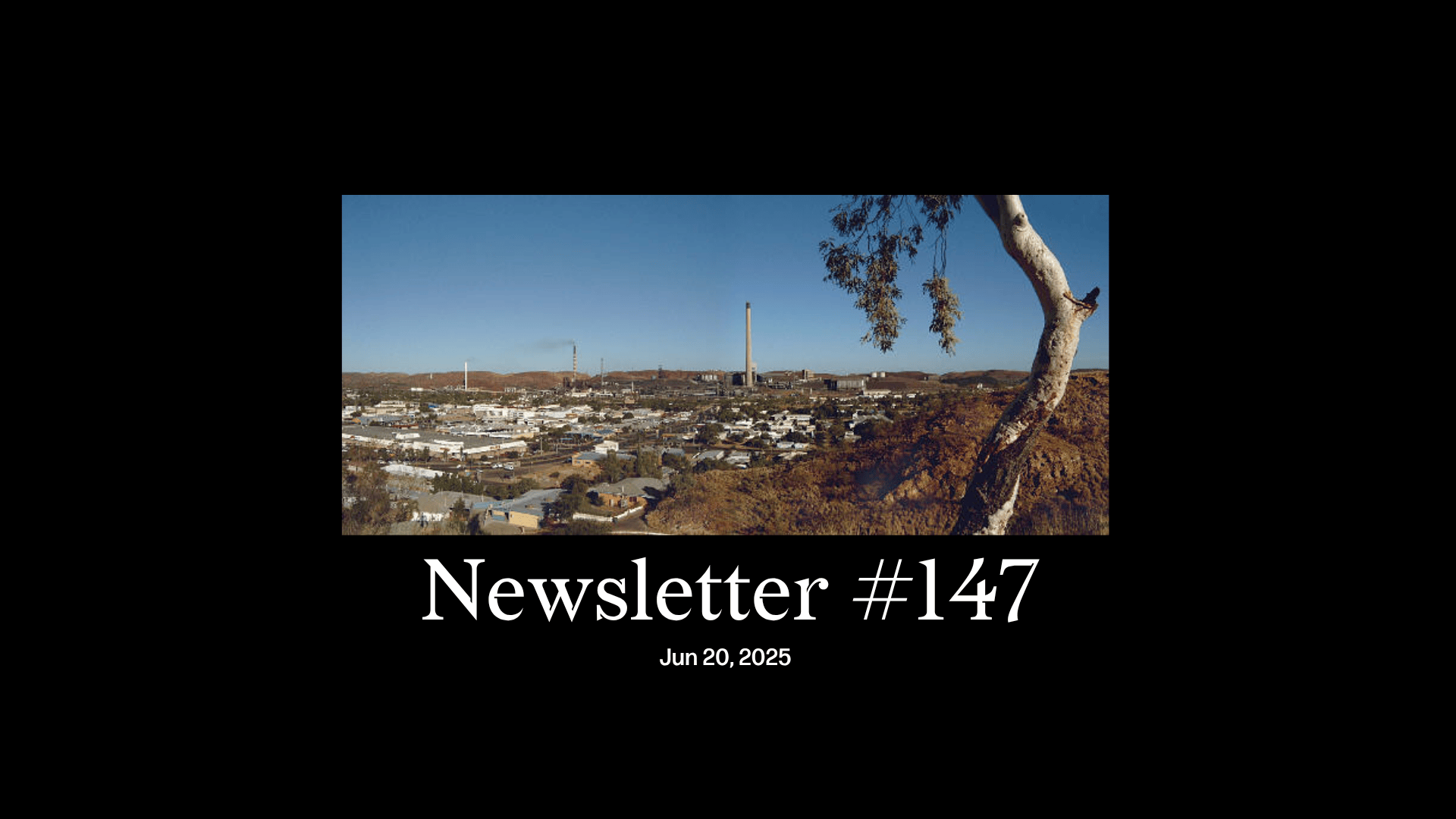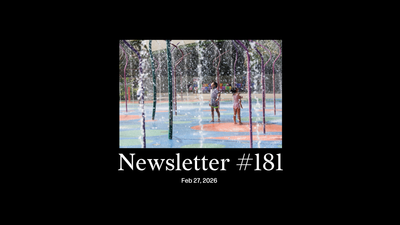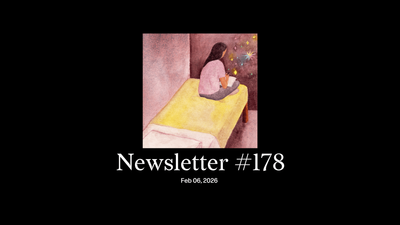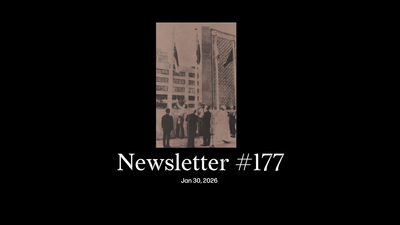Dear reader,
First, congratulations to my co-founder, Charmaine Poh, for winning the Villa Romana Prize, just the latest accolade in an already decorated arts career. (How she finds time to also do all her great work here is beyond me.)
Today we have a longish “build-in-public” newsletter, first reflecting on Jom’s collaborations with activist groups, then discussing the importance of better investigative business journalism in Singapore, so please zip all the way down if you want our usual weekly fare.
Last week, I described how Jom operates alongside the mainstream media. This week, it’s our efforts to curate and spotlight the best activist work in the non-governmental, non-profit space, including the wonderful plethora of advocacy groups active on Instagram. They collectively play a vital, if often underappreciated, role in our media ecosystem: raising awareness of vulnerable communities and of non-mainstream concerns, for instance those of Palestinian supporters and sympathisers here.
Over the past week, we’ve been interacting with Workers Make Possible (WMP), an NGO advocating for workers’ rights here. WMP, among other things, organises the annual People’s Labour Day Rally at Hong Lim Park—Jom recently participated in its third edition. WMP brought to our attention the latest developments in a long-drawn case involving the alleged labour exploitation of 10 Bangladeshi migrant workers by subcontractors of ComfortDelGro. First came a 50-page case dossier, then an investigative video featuring many of the workers. Both were thoroughly researched. Why wouldn’t they be, you might ask. Well, after decades of government propaganda and action against activists, many Singaporeans are still skeptical of their motives and methods. I feel the need to emphasise the rigour.
I feel a bit bad that our Jom team, as we shaped our reporting of this story, took up even more of their time. We appreciate the engagement from Kumarr, a WMP member and host of the aforementioned video. We clarified some doubts, sought comment from Comfort and the Ministry of Manpower (no response from either), and have today published it as our lead blurb in “Singapore This Week”.
And we also have a smaller shout-out to Beyond the Hijab, a platform run by Muslim women in Singapore, which reviewed 13 articles by The Straits Times (ST) to assess its reporting of the Israel-Iran conflict. That’s in “Other SG stuff we like”, further down in this newsletter.
So I wanted to salute our activists, for their often thankless and underpaid labour. Without such groups, Jom simply wouldn’t be able to do some of our best work.
On that note, we want to do a lot more to analyse corporations and the larger economic system under which we live. Should society hold accountable only the sub-contractors for their alleged exploitative labour practices? What is the responsibility of Comfort in ensuring an ethical supply chain?
These are some of the questions we posed, and will continue to, as we slowly nurture our business investigative practice here at Jom. This gets to something I’ve mentioned in different fora, most recently on the “Yah Lah But” podcast: the real journalistic gap in Singapore is not in political analysis (gosh, there’s almost a surfeit now), but in business and financial investigative work.
Our second blurb this week offers evidence of this. Optus, a fully-owned subsidiary of Singtel, this week agreed to a settlement (pending court approval), including a A$100m (S$83.5m) fine, with the Australian Competition and Consumer Commission (ACCC), for “unconscionable conduct” while hawking its telecommunications goods and services to consumers in the Mount Isa region and the Northern Territory.
The case is truly shocking, involving the racist and bigoted exploitation of First Nations people and those with intellectual disabilities. ST, its pages flush with Singtel ads, predictably did not elaborate on the abhorrent details offered by the ACCC. (By contrast, The Sydney Morning Herald and other Aussie papers did.) But neither did BT nor TOC; one might have expected the latter to do so. And, at the moment, I don’t even see a CNA article on it.
Shouldn’t Singaporeans be more concerned about the awful behaviour of a Temasek-linked firm in another country? We’re all implicated.
Regardless, Jom has tried to do our best, in our second blurb of the week. We would have loved to commission a writer to do a long investigative piece, including interviews with victims, but we’re simply not there yet. We are looking for aspiring young writers in this space, so do reach out, and I’m hopeful that we’ll one day have a full-time investigative position. And for those of you wondering about the merits of Jom’s subscription model, well, here’s another reason. We’re not dependent on the government for advertising revenue, and we’re also not dependent on corporations. We can say what we want about them. And the only way we can continue doing this is with your support.
- Why does horrible labour exploitation of migrant workers still exist?
- Singtel-owned Optus fined for deplorable, predatory practices
- Of turtles and their soup-makers
- Is the land swap between Singapore and the regent of Johor a cause for concern?
- How are Singaporean arts companies improving disability access?
And more, in our weekly digest. Read it now.
Essay: “Seeing the unseen: distribution of domestic thought and emotion work”
Today’s essay, by lawyer Nina Sugianto, is on an issue that I know I, and many of my male brethren, are often blissfully unaware of: the forms of domestic and caregiving work that are less visible, and that often fall to the females in the household.
The opening quote should confront us all: “My husband is a fantastic partner. He shares a lot of the family duties and he is great with the kids. But still…he [would be] asking me ‘what do we have going on this weekend’ and I would feel myself getting frustrated.”
Oh yes, the number of times I’ve seen males outsource their social calendaring to their female partners, assuming they’re better at it. Nina, among other things, interrogates the notion that domestic work should be divided along some imagined—or gendered—lines of interest or competence. Her gentle, empathetic and often humorous prose combines Singaporean anecdotes, results from an important Ipsos study on domestic and care work, and her own wealth of conversations, observations and experiences.
“Any discussion of work-life balance, family support or gender equitability is incomplete without acknowledging all forms of domestic work and the gender dynamics involved. Households run, but the question is at what cost, to whom, and how much better can we be?”
All of us, whether in our guise as parents, children or just partners, can always do better. Thank you, Nina, for telling us how.
Jom baca,
Sudhir Vadaketh
Editor-in-chief, Jom
p.s. There are a handful of tickets left for our Jom Cakap on “Scam Inc”, next Tuesday at The Projector. Get yours now.
If you’ve enjoyed our newsletters, please scroll to the bottom of this page to sign up to receive them direct in your inbox.







